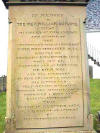|
Rev William
Guthrie of Fenwick.

Fenwick is
a small village to the north of Kilmarnock in Ayrshire but it sits
large in the annals of the Covenanters. A centre for resistance
despite the close proximity of military garrisons at Kilmarnock
and Newmilns. It was an area subject to repeated raids by the
dragoons which is given testimony by there being more Covenanter
gravestones here than any other locality in Scotland, with seven
victims of the Killing Times. Captain John Paton, executed
in Edinburgh and buried in Greyfriars in May 1684 was from
Meadowhead within the parish. A later son of Fenwick was John
Howie of Lochgoin who was one of the major historians and
writers about the Covenanters, and author of “ The Scots Worthies “.
To this village as its first Minister came the Rev William
Guthrie, a cousin of James Guthrie of Stirling.
William
Guthrie was born in 1620 in Pitforthy, near Brechin ,Forfarshire. He
was the eldest of five boys, no fewer than four of whom became
Covenanting ministers – Robert, Alexander and John, as well as
William. At St Andrews he was given a classical and
philosophical education aided by his cousin James and the
recently appointed Samuel Rutherford. Prepared for the ministry
under their guidance he also took the step of foregoing his
inheritance as the eldest son giving the rights to the brother
who did not take up the calling.
He was
for a while tutor to Lord Mauchline, son of the Earl of
Loudon., and while there preached in the town of Galston where
some Covenanters from Fenwick heard him. The request for him to
come to Fenwick was stalled for some time by Lord Boyd, a
Royalist who disapproved of anyone recommended by the Earl of
Loudon. The objections were overcome eventually and in November
1644 William Guthrie was ordained minister of Fenwick where he was
to faithfully serve for twenty years until the bishops and
dragoons forced him out.
He married
a distant relative of the Earl of Loudon, Agnes Campbell , in
August 1644. and settled down to a life of devotion and caring
to his parish. But he was also a risk taker in the course of
his beliefs being present with six other ministers at a
skirmish on Mauchline Moor in 1648 when some 2000 people,
some armed, were at a massed communion
and broken up by troopers under Sir
James Turner ( later to be seized during the Pentland Rising ).
In 1650 Guthrie was with the army that was routed at
Dunbar
by Cromwell`s forces. Yet he was not a healthy man and this at
times gave him a ` melancholic` attitude reflected in sermons
that were grave and sad. He was too a man of mirth and humour
who delighted in being friendly, and enjoyed such company.
He had a
surprising reputation as a good angler, which was one of his
main relaxations but inevitably it was his calling to be ` a
fisher of men ` within the Parish of Fenwick. The parish was
widespread with some people living six miles away in a
countryside with few roads and much moor land and morasses. It
was not easy to get to church that is for sure, and so much
easier to use the Sabbath as a day of relaxation. To this
Guthrie responded with several stratagems, including disguising
himself and seeking a nights lodging in a cottage and then
spend the evening in discourse with the household. He is said to
have offered a well known poacher half a crown to attend church
which was accepted. But in later weeks the poacher attended
without a bribe having learnt that there was greater value to
had than a pocketful of coins. On another occasion he was a
guest overnight in a house that did not follow the practice of
bringing out “ the Books “ for evening prayer. He enquired if he
might join them in their devotions but the householder said that he
had no gift for prayer , ere long though he was on his knees with
his family aided in their prayers by a solicitous Guthrie.
Guthrie
was widely traveled in his ministry throughout the western
shires as evidenced by the tale of a merchant of Glasgow who
was returning from Ireland and found himself stranded on the
isle of Arran for the Sabbath. Here he was decidedly unhappy
that he would only be able to hear a sermon in Gaelic but on
arriving at church found the inestimable William Guthrie as the
visiting preacher. On another occasion when in Angus to the
north, Guthrie sought overnight shelter in the home of a known
opponent of the Covenanters and eventually confessed he was a
minister and sought permission to pray. Reluctantly allowing it
under ancient rules of courtesy, the three daughters of the house
joined Guthrie in prayer and were converted such that the next
day the local curate was made to stand aside so that Guthrie
might preach in his stead.
The
consequence of his ministrations was that Fenwick gained a
reputation as the place to be, with people moving into the
parish and traveling from Glasgow, Paisley, Hamilton and Lanark to
hear him preach. It seems that Guthrie`s especial gift was to
be able to speak to the people in their own dialect . He also
had a clarity of thought that enabled him to reduce complex
arguments to simple prose which he displayed in a small book “
The Christians Great Interest “ which he published in 1659.
Since reprinted very many times, it has become one of the most read books
of all time and a comfort to Christians everywhere.
Guthrie
had never really had much faith in King Charles and foresaw
the coming bloodshed but he was for a while under the
protection of friends at Court – the Earl of Eglinton and the
Earl of Glencairn. Thus for four years he continued his ministry
with ever growing congregations. He was active too, in the
meetings of the Glasgow Synod and favoured a straight spoken
address to ` the Godless Parliament in Edinburgh `.
In July
1664 the blow finally came when the Curate of Calder, accompanied
by twelve troopers, arrived to suspend William Guthrie from office
and declare his church vacant. He remained in Fenwick for a
few months longer before ill health and the death of the
brother to who he had foregone his inheritance took him back to
Pitforthy. There on the 10th October 1665 aged only forty five
years, he was released from a troublesome world.

|